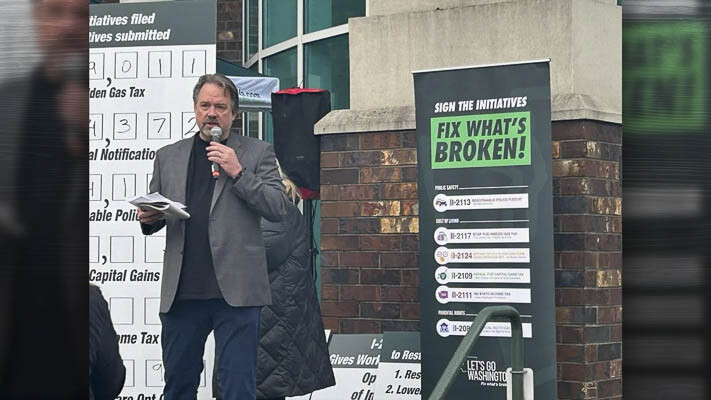
Initiative 2117, which has been certified for the ballot by the Secretary of State’s Office, would repeal the CCA’s cap and trade carbon auctions
TJ Martinell
The Center Square Washington
An initiative on the November ballot could eliminate almost all of the revenue currently diverted by the state toward electrifying the public and private transportation sector.
According to a Wednesday presentation by the Electric Vehicle Coordinating Council, 84 percent of all funding for zero emission vehicle investments comes from revenue generated by the 2021 Climate Commitment Act.
Initiative 2117, which has been certified for the ballot by the Secretary of State’s Office, would repeal the CCA’s cap and trade carbon auctions that have already generated billions in new revenue. Of that, $671 million has been dedicated to ZEV investments. Critics refer to the carbon auction as a “hidden gas tax,” arguing that it has led to increased gas prices in Washington compared to other states.
If approved by voters, it will represent one more hurdle for state efforts to electrify the transportation sector. Although the council approved a transportation electrification strategy last year, it has already acknowledged that it won’t meet its 2030 emission goals. On top of that, the state will need three million more charging ports to accommodate new EVs on the road. The cost of the ports will depend on the type, with the average cost of installation $300 to $1,500 cost for a single EV port level 1, $6,000 for single EV port level 2, and $10,000-$40,000 for DC fast charging port.
Further, they will also have to contend with the increased load on the electrical grid. Clark County recently announced a program offering $50 credit to EV owners who promise not to charge their vehicles during “peak hours.” Clark County currently has 20 EVs per 1,000 residents. The county with the highest is San Juan, with 50.7 EVs per 1,000 residents, while Garfield County has the lowest at 1.3 per 1,000 residents.
EV charging infrastructure currently makes up 33% of state funding for EV investments. Most of the EV investment spending (61%) is through the Washington State Department of Transportation. Almost half (45%) of the state spending is on EV vehicles to convert the existing public fleet.
While the latest state supplemental budget increased spending by $100 million, $130 million or 19% of approved spending has been delayed in response to I-2117.
While the remaining amount will still be spent regardless of whether voters approve I-2117 in November, state Department of Commerce’s Transportation Electrification Policy Lead Steven Hershkowitz told the Electric Vehicle Coordinating Council at its Wednesday meeting that “would not continue to roll over should that policy go away. It really is a significant chunk … of where ZEV are being funded right now.”
The council’s next meeting is May 1.
This report was first published by The Center Square Washington.
Also read:
- House Democrats advance $18B in tax hike proposals as session winds downHouse Democrats in Washington advanced several tax hike proposals as the legislative session nears its end, aiming to address a major budget shortfall.
- Republican budget leaders see showdown ahead as Senate Democrats approve trio of major tax increasesSenate Democrats in Washington have approved major tax increases, prompting Republican budget leaders to warn of a growing showdown ahead.
- Representatives from the 18th and 20th Legislative Districts to hold joint town hall on May 3Lawmakers from the 18th and 20th Legislative Districts will host a joint town hall on May 3 at Battle Ground City Hall to review the legislative session and hear from residents.
- Expect delays on northbound I-5 near Ridgefield through May 9Northbound I-5 travelers near Ridgefield should expect delays through May 9 as crews work on improvements at the Exit 14 off-ramp to support future development.
- Brandon Erickson announces candidacy for Clark County Charter Review CommissionBrandon Erickson has announced his candidacy for the Clark County Charter Review Commission, seeking Position 1 in District 2.
- Clark County Sheriff’s Office investigating a reported burglary that led to apparent suicideThe Clark County Sheriff’s Office is investigating a reported burglary in Vancouver that ended with the apparent suicide of Charles Gardiner, interim chief of the Cowlitz Tribal Public Safety Department.
- POLL: Why did voters reject all three tax proposals in the April 22 special election?Clark County voters rejected all three tax measures on the April 22 special election ballot, prompting questions about trust, affordability, and communication.











